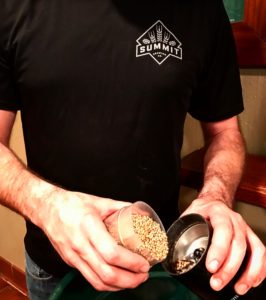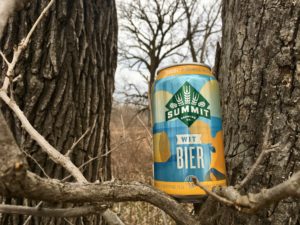You Don’t Just Run to the Grocery Store and Buy a Sack of Navel Oranges: How Summit Brewing Sources Ingredients
 Summit Wit Bier, a traditional Belgian white beer with aromas of spice, citrus and flowers, is unique among our beers due to a few key kettle additions — namely, orange peel, grains of paradise, and coriander, which we ground up fresh right here at our St. Paul brewery with a Mr. Coffee grinder.
Summit Wit Bier, a traditional Belgian white beer with aromas of spice, citrus and flowers, is unique among our beers due to a few key kettle additions — namely, orange peel, grains of paradise, and coriander, which we ground up fresh right here at our St. Paul brewery with a Mr. Coffee grinder.
Though these special ingredients have been common to classic Belgian white beers going on 400 years, they are new to the relatively youngish Summit Brewing Co. And whenever we introduce new ingredients to our production process, well, that means some extra work for everyone — so says Summit Quality Assurance Lab Technician Paul Bergeland. With a BA in Biology from St. Olaf College and experience at companies like Nestle and Yoplait, Bergeland knows his way around the Quality Lab.
“First, our brewers have to get samples of the ingredient and determine if it’s good enough to use,” Bergeland says. “Then they have to decide on quantity and concentration.” Perhaps it goes without saying, but the brew team isn’t just running out to the grocery store for a sack of Navel oranges. Ingredients like these are carefully sourced and thoroughly vetted.
“Additionally, when we’re trialing new beers and ingredients,” Bergeland explains, “the brew team uses the pilot system. It isn’t identical to the big system, but it’s a lower commitment because it produces a smaller quantity of beer. Mainly, it helps give us a snapshot into the future beer.”
After tasting the trial run, the brewers tweak the ingredient in question for balance and dial in the recipe according to their tastes. Then they get a third party involved — the Quality Team — to verify what they’re smelling and tasting.
And dudes! That’s just for one ingredient! With Summit Wit Bier, this process was multiplied by three: Orange peel, grains of paradise, and all that fresh-ground coriander, too.
“QA works synergistically with the brew team to elevate one another,”  Bergeland says. “We’re very critical with new ingredients and ingredient changes, so we consult with each other often, take samples constantly, monitor the beers, and record everything we can. We won’t sacrifice quality even if doing so is cheaper or more efficient. The beer has to be good.”
Bergeland says. “We’re very critical with new ingredients and ingredient changes, so we consult with each other often, take samples constantly, monitor the beers, and record everything we can. We won’t sacrifice quality even if doing so is cheaper or more efficient. The beer has to be good.”
Once the ingredients are approved, balanced, and verified, and once the beer is scaled up to the big system, the Quality Assurance teams finally kicks back and leisurely tastes the final result. Every day. While taking and comparing notes. Pages and pages of notes. Which they enter into spreadsheets. Terrible, never-ending, soul-sucking spreadsheets. OK, this doesn’t sound relaxing at all.
“You never know how a new ingredient will age,” Bergeland says, “so we’re diligent about collecting that data — even after the beer is packaged and out the door.”
In truth, the Quality Assurance team keeps two six-packs of every single batch of Summit beer — one cold-stored and one warm-stored — to taste and analyze throughout its shelf-life. #JobPerks
“We’ll definitely watch Wit Bier closely for aging,” Bergeland says, “but even though it’s lightly hopped and low in ABV, we expect good shelf stability. Especially if it’s stored cold.”
Keep an eye on the Summit blog in the coming weeks to learn more about our Quality Assurance team, our new Boundary Waters Box beers, and the benefits of cold storage versus warm storage.
